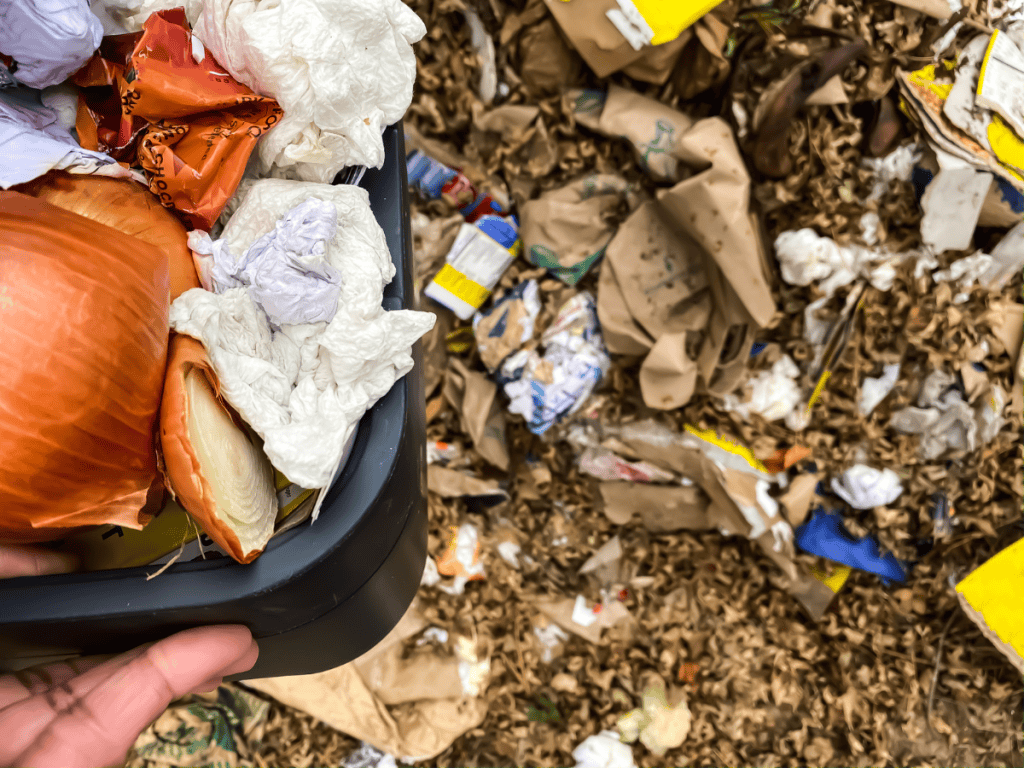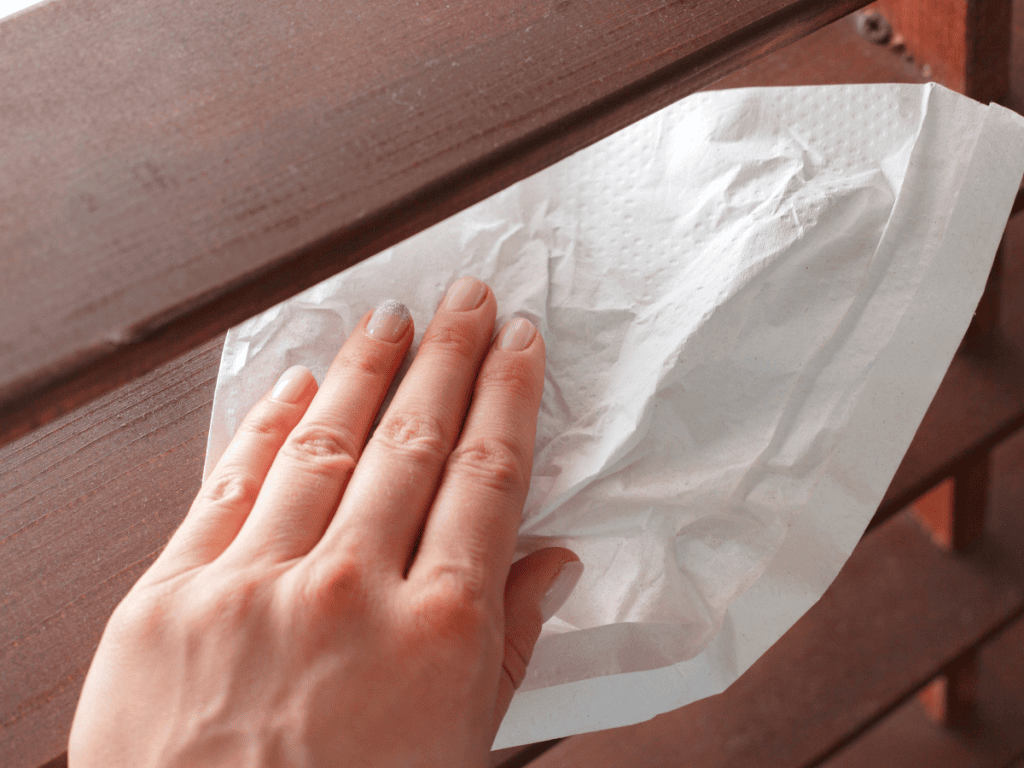In my journey toward a greener lifestyle, I’ve often pondered whether paper towels are compostable. As a staple in kitchens worldwide, they are widely used to dry your hands or clean up spills. However, paper towels present a unique situation unlike organic materials that are a clear fit for the compost bin. Are paper towels compostable? While paper towels are compostable, their suitability for your compost pile depends on their level of contamination. If they’re lightly soiled, they can join other compostable materials, but they should be excluded if they’ve been used with chemicals or cleaning agents.
It’s essential to recognize that paper towels are not recyclable due to the fibers’ degradation after use. However, composting them is a sustainable practice. Within the compost heap, bacteria and microorganisms break down the cellulose fibers in paper towels, contributing to the nutrient-rich humus that benefits garden soil. But as I integrate them into my compost, I am mindful of the balance, ensuring that they are only one component of a diverse mix of green and brown materials.
Understanding the Compostability of Paper Towels
The question of whether paper towels are compostable is a nuanced one. Fundamentally, paper towels are made from cellulose fibers, which are natural and biodegradable. This makes them suitable for composting, decomposing and returning nutrients to the earth. Composting paper towels is not only a way to reduce waste but also a means to create valuable compost that can enhance soil quality in gardens and landscapes.
However, the compostability of paper towels can be affected by what they have been used to clean. Paper towels that have come into contact with organic substances like water, vegetable peelings, or bread crumbs can safely be added to a compost pile. In contrast, those used with oils, chemicals, or meat products may attract pests or leach harmful substances into the compost and, therefore, should be avoided. This distinction guides me as I decide which paper towels to compost.
What Defines a Compostable Paper Towel?
Identifying which paper towels are compostable is critical for maintaining a healthy compost pile. A compostable paper towel has been used to absorb organic materials and is free from synthetic chemicals and oils. These paper towels are primarily composed of cellulose, a plant-based material that decomposes readily in the presence of bacteria and microorganisms in a compost setting. Ensuring that only suitable paper towels enter the compost helps create a balanced ecosystem that can effectively break down waste into nutrient-rich compost.
The Breakdown Process of Paper Towels in Composting
The decomposition of paper towels in a compost pile is a fascinating process. Bacteria and microorganisms are the primary agents that break down the cellulose fibers. The process is relatively fast; in an active and well-maintained compost pile, paper towels can break down in about two to six weeks. Moisture, oxygen, and the correct balance of green and brown materials in the compost are crucial for optimizing the breakdown process. As I maintain my compost, I ensure it’s well-aerated and moist to facilitate the decomposition of paper towels and other organic materials.
The Environmental Impact of Paper Towels
The convenience of paper towels is undeniable, but their environmental impact is a growing concern. The production of paper towels involves significant resource consumption, including water, trees, and energy. After their single-use, many paper towels end up in landfills where, if not composted, they contribute to methane emissions as they decompose anaerobically. By composting paper towels, I aim to mitigate this impact by reducing landfill waste and converting them into beneficial compost that supports plant growth.
Moreover, the ecological footprint of paper towel production extends to the emissions released during manufacturing and transportation. By composting paper towels, I am stepping towards lessening the demand for virgin paper products and encouraging a circular economy where waste materials are repurposed to nourish the environment rather than harm it.
The Biodegradability of Paper Towels
Paper towels boast a high level of biodegradability due to their cellulose composition. This attribute makes them an excellent candidate for composting, as they naturally break down into simpler organic compounds. In my compost bin, I witness firsthand how paper towels, under the right conditions, can transition from waste to a valuable addition to the garden, enriching the soil with organic matter and improving its structure.
The Recycling Dilemma of Paper Towels
While many paper products are recyclable, paper towels present a recycling dilemma. Due to their typical use in cleaning up messes and absorbing liquids, paper towels are not recyclable. The fibers become too short and saturated with contaminants to be processed into new paper. This limitation drives home the importance of composting as an alternative route to repurpose paper towels, turning potential waste into a resource for my garden.
The Ecological Footprint of Paper Towel Production
The ecological footprint of paper towel production is considerable. It involves deforestation, water consumption, and energy use, all of which have a significant environmental impact. By composting paper towels instead of discarding them, I contribute to reducing this footprint. Each composted paper towel is a small but meaningful step towards a more sustainable future, as it diverts waste from landfills and reduces the need for new raw materials.

Practical Tips – Are Paper Towels Compostable
Composting paper towels is a straightforward process that can significantly benefit the environment. First, I ensure that only paper towels, free from chemicals and heavy contamination make it into my compost bin. These include towels for drying washed fruits and vegetables or clean hands. I tear them into smaller pieces to expedite their decomposition and mix them with carbon-based materials like leaves and straw in my bin.
Maintaining a proper balance between ‘greens’ like food scraps, and ‘browns’ like paper towels in the compost is also important. This balance helps regulate moisture levels and ensures that the compost pile remains aerated, which is crucial for effective composting. By following these simple guidelines, I can turn waste into a resource and close the loop on paper towel usage.
Home Composting Guidelines for Paper Towels
For home composting, I’ve established guidelines to compost paper towels effectively. When adding paper towels to my compost, I check that they are lightly soiled and haven’t been used with chemical cleaners or to clean up meat, dairy, or oily substances. I shred them to increase the surface area for microorganisms to work on and layer them with other organic materials, maintaining a balanced mix in my compost pile. This routine helps create a rich and healthy compost that benefits my garden without attracting pests or emitting foul odors.
Segmenting Safe and Unsafe Paper Towels for Your Pile
When deciding to compost paper towels, I differentiate between those that are safe to compost and those that are not. Safe paper towels include those that have absorbed water or organic materials. In contrast, towels that have come into contact with hazardous chemicals, grease, or animal products are unsafe for composting. I segregate these towels to prevent bin contamination with other carbon-based materials, ensuring that my compost remains a wholesome addition to my garden.
Commercial Composting: Is It a Viable Option?
Commercial composting facilities can handle a wider range of materials than I can in my backyard, including paper towels that might not be suitable for home composting. These facilities can reach higher temperatures, breaking down tougher materials and killing pathogens. Considering paper towel alternatives designed to be compostable can also be a good strategy when commercial composting is available.
The Difference Between Home and Commercial Composting Processes
Home and commercial composting processes differ mainly in scale and temperature. Commercial facilities can achieve higher temperatures, which allows for the breakdown of a wider variety of materials, including some that may not decompose easily in a home composting setup. This distinction is crucial when considering what to compost at home versus what might be better suited for commercial composting.
Pros and Cons of Paper Towel Composting
Composting paper towels has advantages, such as reducing waste and creating a valuable soil amendment. However, there are also potential drawbacks to consider. One must be cautious about what is being composted, as towels used with chemicals or oils can contaminate the compost. Additionally, if not managed properly, a compost pile with too many paper towels can become overly dense and slow the composting process. Balancing these pros and cons is key to successful composting practices.
On the positive side, composting paper towels reduces the volume of waste going to landfills and the associated methane emissions. It also recycles the nutrients and fibers into the soil, enhancing its quality. Yet, carefully considering what is added to the compost is required to avoid attracting pests or creating an imbalance in the compost pile.
Advantages of Adding Paper Towels to Your Compost
There are clear advantages when I compost your paper towels. They serve as a carbon-rich ‘brown’ material in the compost, which helps to balance the nitrogen-rich ‘greens’ like food scraps. This balance is essential for creating compost rich in nutrients and has a good structure. Additionally, composting paper towels means I’m playing a part in reducing the amount of organic waste in landfills, helping to lower greenhouse gas emissions.
Potential Drawbacks to Consider
While composting paper towels is a sustainable practice, it has challenges. One major drawback is the potential introduction of chemicals into the compost bin. Paper towels with harsh cleaning agents or personal care products may contain substances harmful to the macro and microorganisms essential to the composting process. Additionally, the inks and dyes used in decorative or colored paper towels might not be suitable for a healthy compost mix. It’s also worth noting that composting a high volume of paper towels can disturb the balance of greens and browns, slowing down the decomposition process.

Step-By-Step: How to Incorporate Paper Towels into Your Compost
- Starting a compost pile in your kitchen doesn’t have to be daunting. I began by collecting used paper towels in a designated container, such as a countertop compost bin.
- Adding enough water to dampen the towels, I covered the container and placed it in a sunny location. This simple method allows the paper towels to break down gradually.
- After two to four weeks, the decomposed material can be added to garden beds or potted plants as mulch, contributing to soil health and reducing landfill waste.
- For a more comprehensive approach, I add these damp paper towels to my larger compost pile outdoors. I ensure they’re mixed in with other organic materials, maintaining a balanced ratio of greens to browns.
- Regularly turning the compost pile helps to distribute air and moisture, two critical factors in breaking down the paper towels into usable compost that will eventually nourish my garden.
Initiating the Composting Process in Your Kitchen
Composting can start in the kitchen by thoughtfully managing food waste and other compostable materials. I keep a small bin for kitchen scraps, eggshells, and paper products. As a part of my daily routine, I add vegetable peelings and other organic waste to this bin. These small steps reduce the amount of waste sent to landfills and provide a rich source of nutrients for my garden compost, promoting a sustainable cycle within my household.
Maintaining Your Compost for Optimal Decomposition
Ensuring the successful decomposition of compostable materials, including paper towels, requires regular maintenance of the compost pile. I aim to balance the carbon-rich browns, such as dry leaves and shredded paper, with the nitrogen-rich greens, like kitchen scraps and lawn clippings. This balance is crucial for supporting the microorganisms digesting paper towels and other organic matter. Adequate moisture and frequent pile turning are essential to facilitate a healthy and efficient decomposition process.
Discovering Sustainable Alternatives to Paper Towels
As I explored ways to reduce my environmental impact, I found several sustainable paper towel alternatives. Swedish dishcloths have been a game-changer in my kitchen. Made from cellulose, these cloths are highly absorbent and can be used repeatedly for up to nine months with proper care. They dry quickly, preventing the buildup of mildew and odors. I’ve also embraced using unbleached paper towels for tasks where disposables are necessary. These paper towels are less processed than their bleached counterparts and offer a more environmentally conscious option.
Another alternative is organic cotton cloths. These are made from natural fibers and are free from synthetic chemicals, making them a safe and sustainable choice. I’ve found that they can effectively clean up dirt and spills without leaving behind the paper towel waste that’s so common with disposable paper towels. Using these alternatives has reduced my reliance on traditional paper towels and supported a more sustainable lifestyle overall.
Reusable Options to Reduce Waste
In my journey towards sustainability, I’ve discovered that Swedish dishcloths and other reusable options effectively reduce disposable paper towel waste. These alternatives are environmentally friendly and economical in the long run. Swedish dishcloths have been a valuable addition to my cleaning routine. They can absorb their weight in liquid and be washed and reused countless times, helping curb the excessive use of disposable paper towels and their consequent environmental impact.
Advantages
Adopting reusable alternatives to disposable paper towels offers several benefits. They are cost-effective over time, as they can be washed and reused, reducing the need to purchase disposables continually. These alternatives also contribute to less waste generation, helping to alleviate the burden on landfills. Furthermore, many of these products, such as organic cotton cloths and Swedish dishcloths, are made from sustainable materials with a lower ecological footprint than traditional paper towels.
Disadvantages
Despite their benefits, there are some drawbacks to using reusable alternatives to paper towels. They require regular laundering, which can increase water and energy usage. There is also the initial investment in purchasing high-quality reusable products, which may be more expensive upfront than a pack of disposable paper towels. Additionally, for some cleaning tasks, particularly those involving harsh chemicals or contaminants, disposable towels may still be necessary for safety and hygiene purposes.

Expert Insights: Maximizing the Benefits of Composting Paper Towels
Experts agree that composting paper towels can be integral to a sustainable waste management strategy. Adding paper towels to a garden compost can create a nutrient-rich amendment for soil, which is beneficial for plant growth and health. The key to maximizing these benefits is ensuring that the paper towels are free from contaminants and are added to the compost in appropriate amounts to maintain the necessary balance of organic materials.
Properly managed composting can also help to reduce methane emissions from landfills, as organic materials like paper towels decompose aerobically in a compost pile rather than anaerobically in a landfill setting. This process benefits the environment by reducing greenhouse gas emissions and enriches the soil, enhancing its structure and fertility.
The Role of Paper Towels in a Balanced Compost
In my composting experience, I’ve observed that paper towels can positively create a balanced compost mixture. The key is to use them in moderation and ensure they are not contaminated with harmful chemicals. When used to clean up dirt or food spills, paper towels decompose well and contribute to the necessary carbon content in the compost pile. Tearing wet paper towels into smaller pieces will help accelerate decomposition and avoid creating large, compact clumps that might impede airflow. It’s also important to avoid composting paper towels soiled with human or animal waste, as they can introduce pathogens to the compost.
The Long-Term Positive Effects on Soil Health
Composting paper towels and other organic materials can have a long-term positive impact on soil health. By turning paper towels into compost instead of sending them to a landfill, we can reduce the release of methane gas and create a useful product that enhances soil fertility. Compost improves the soil’s ability to retain moisture and nutrients, supports beneficial microbial activity, and can reduce the need for chemical fertilizers. In addition, using compost in the garden can help to break down and decompose other materials that are more challenging to recycle, such as paper plates and cooking oils, further promoting a healthy and sustainable environment.
Weighing the Impact on Your Green Lifestyle
Integrating compostable materials into my daily routine is more than an eco-friendly gesture; it’s a commitment to a green lifestyle. Utilizing paper towels that can be composted plays a significant part in this. When I add shredded paper or coffee grounds to my compost pile, I actively reduce waste and contribute to a natural recycling process. This benefits the environment by decreasing landfill use and enriches my garden soil with valuable nutrients. Composting these items creates a symbiotic relationship between my waste habits and the health of my local ecosystem.
However, the impact of using paper towels extends beyond my compost bin. It’s crucial to consider the lifecycle of these products, from manufacturing to disposal. I can reduce my ecological footprint by opting for paper towels made from recycled materials or those sourced from sustainable forests. It’s a holistic approach encompassing responsible purchasing, mindful usage, and thoughtful disposal, ensuring that my green lifestyle is as effective and sustainable as possible.

Taking Action for a More Sustainable Future
Choosing a sustainable paper towel is the first step toward a greener future. By selecting recycled paper towels, I’m not just keeping my home free from harsh chemicals but also ensuring that my compost pile remains a nutrient-rich haven for my garden. Supporting companies prioritizing the environment sends a powerful message against pollution and wasteful practices. It’s a conscious choice to be part of a movement that values the planet and its future, encouraging industries to adopt more eco-friendly methods.
As I support eco-conscious businesses, I’m not just a consumer but an advocate for change. Every purchase of a sustainable paper towel is a vote for a cleaner world. It’s a straightforward action with profound implications, demonstrating that environmentally damaging companies can no longer remain competitive in an increasingly green economy. By aligning my purchasing habits with my values, I take responsibility for the well-being of our planet, advocating for a sustainable and thriving future for all.
Closing Thoughts on the Compostability of Paper Towels
Considering the compostability of paper towels, the conclusion is clear: these items can play a valuable role in an eco-friendly composting system. Tear them into smaller pieces, excluding any soiled with oil or grease, for optimal breakdown. In a well-maintained compost heap, paper towels aid in creating necessary airflow, aligning with waste reduction principles. However, not all paper towels are equal; some may emit greenhouse gases during production. Recycling facilities offer a better alternative in such cases. For those aiming to minimize their impact further, reusable alternatives are attractive. Turning paper towels and compostable ingredients every 2-3 days ensures a healthy decomposition process, fortifying dedication to sustainability.